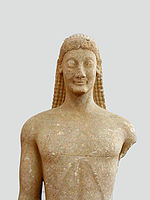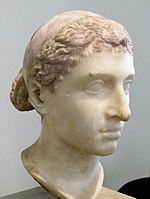This article is about the Greek people. For the finance term, see Greeks (finance).
 1st row: Homer • King Leonidas • Pericles • Herodotus •Hippocrates 2nd row: Socrates • Plato • Aristotle • Alexander the Great •Archimedes 3rd row: Hypatia • Basil II • Alexios Komnenos • Gemistos Plethon • El Greco 4th row: Rigas Feraios • Theodoros Kolokotronis • Laskarina Bouboulina • Georgios Karaiskakis • Ioannis Kapodistrias • 5th row: Eleftherios Venizelos • Constantine Cavafy •Georgios Papanikolaou • Archbishop Makarios • Pyrros Dimas | |||||||||||||||||||||||||||||||||||||||||||||||||||||||||||||||||||||||||||
| Total population | |||||||||||||||||||||||||||||||||||||||||||||||||||||||||||||||||||||||||||
|---|---|---|---|---|---|---|---|---|---|---|---|---|---|---|---|---|---|---|---|---|---|---|---|---|---|---|---|---|---|---|---|---|---|---|---|---|---|---|---|---|---|---|---|---|---|---|---|---|---|---|---|---|---|---|---|---|---|---|---|---|---|---|---|---|---|---|---|---|---|---|---|---|---|---|---|
| approx. 14 - 17 million [1] | |||||||||||||||||||||||||||||||||||||||||||||||||||||||||||||||||||||||||||
| Regions with significant populations | |||||||||||||||||||||||||||||||||||||||||||||||||||||||||||||||||||||||||||
| |||||||||||||||||||||||||||||||||||||||||||||||||||||||||||||||||||||||||||
| Languages | |||||||||||||||||||||||||||||||||||||||||||||||||||||||||||||||||||||||||||
| Religion | |||||||||||||||||||||||||||||||||||||||||||||||||||||||||||||||||||||||||||
| Related ethnic groups | |||||||||||||||||||||||||||||||||||||||||||||||||||||||||||||||||||||||||||
Greek Cypriots, Pontic Greeks, Karamanlides, Griko people,Romaniotes, Tsakonians,Antiochian Greeks,Arvanites,Souliotes,Macedonians (Greeks),Maniots,Northern Epirotes,Phanariotes,Sarakatsani,Sfakians,Slavophone Greeks,Urums (all of them are not considered to be different ethnic groups but subgroups with more particularly dinstictive characteistics than others, such as the significant difference between Demotic and their dialects and the fact that by having traditionally little conection with mainland Greece have developed a particular regional identity) | |||||||||||||||||||||||||||||||||||||||||||||||||||||||||||||||||||||||||||
| Footnotes | |||||||||||||||||||||||||||||||||||||||||||||||||||||||||||||||||||||||||||
| a Higher figure includes those of ancestral descent. b Those whose stated ethnic origins included "Greek" among others. The number of those whose stated ethnic origin is solely "Greek" is 145,250. An additional 3,395 Cypriots of undeclared ethnicity live in Canada. bApprox. 60,000 Griko people and 30,000 post WW2 migrants. d "Including descendants". |
The Greeks (Greek: Έλληνες, [ˈelines], Ellenes), also known as Hellenes, are a nation and ethnic group native to Greece, Cyprus and neighboring regions. They also form a significant diaspora, with Greek communities established around the world.[31]
Greek colonies and communities have been historically established in most corners of the Mediterranean, but Greeks have always been centered around the Aegean Sea, where the Greek language has been spoken since antiquity.[32] Until the early 20th century, Greeks were uniformly distributed between the Greek peninsula, the western coast of Asia Minor, Pontus, Egypt, Cyprus and Constantinople; many of these regions coincided to a large extent with the borders of the Byzantine Empire of the late 11th century and the Eastern Mediterranean areas of the ancient Greek colonization.[33]
In the aftermath of the Greco-Turkish War (1919–1922), a large-scale population exchange between Greece and Turkey transferred and confined ethnic Greeks almost entirely into the borders of the modern Greek state and Cyprus. Other ethnic Greek populations can be found from southern Italy to the Caucasus and in diaspora communities in a number of other countries. Today, most Greeks are members of the Greek Orthodox Church.[34]
Contents[hide] |
[edit]History
Further information: History of Greece
The Greeks speak the Greek language, which forms its own unique branch within the Indo-European family of languages, the Hellenic.[32] They are part of a group of pre-modern ethnicities, described by Anthony D. Smith as an "archetypal diaspora people".[35][36]
The modern Greek state was created in 1832, when the Greeks liberated a part of their historic homelands from the Ottoman Empire.[37] The large Greek diaspora and merchant class were instrumental in transmitting the ideas of western romantic nationalismand philhellenism,[38] which together with the conception of Hellenism, formulated during the last centuries of the Byzantine Empire, formed the basis of the Diafotismos and the current conception of Hellenism.[39][40][41]
[edit]Origins
Further information: Proto-Greek language and List of Ancient Greek tribes
The Proto-Greeks probably arrived at the area now called Greece, in the southern tip of the Balkan peninsula, at the end of the 3rd millennium BC.[42][43][a] The sequence of migrations into the Greek mainland during the 2nd millennium BC has to be reconstructed on the basis of the ancient Greek dialects, as they presented themselves centuries later and is subject to some uncertainties. There were at least two migrations, the first of the Ionians and Aeolians which resulted in Mycenaean Greece by the 16th century BC,[32][44] and the second, the Dorian invasion, around the 11th century BC, displacing the Arcadocypriot dialects which descended from the Mycenaean period. Both migrations occur at incisive periods, the Mycenaean at the transition to the Late Bronze Ageand the Doric at the Bronze Age collapse.
There were some suggestions of three waves of migration indicating a Proto-Ionian one, either contemporary or even earlier than the Mycenaean. This possibility appears to have been first suggested by Ernst Curtius in the 1880s. In current scholarship, the standard assumption is to group the Ionic together with the Arcadocypriot group as the successors of a single Middle Bronze Age migration in dual opposition to the "western" group of Doric.
[edit]Mycenaean
Main article: Mycenaean Greece
The Mycenaeans were ultimately the first Greek-speaking people attested through historical sources, written records in the Linear B script,[45] and through their literary echoes in the works of Homer, a few centuries later.
The Mycenaeans quickly penetrated the Aegean Sea and by the 15th century BC had reached Rhodes, Crete, Cyprus, where Teucer is said to have founded the first colony, and the shores of Asia Minor.[32][46] Around 1200 BC the Dorians, another Greek-speaking people, followed from Epirus.[47] Traditionally, historians have believed that the Dorian invasion caused the collapse of the Mycenaean civilization, but it is likely the main attack was made by seafaring raiders (sea peoples) who sailed into the eastern Medditeranean around 1180 BC.[48] The Dorian invasion was followed by a poorly attested period of migrations, appropriately called the Greek Dark Ages, but by 800 BC the landscape of Archaic and Classical Greece was discernible.[32]
In the Homeric epics, the Greeks of prehistory are viewed as the ancestors of the early classical civilization of Homer's own time,[49] while the Mycenaean pantheon included many of the divinities (e.g. Zeus, Poseidon and Hades) attested in later Greek religion.[50][51]
[edit]Classical
Main article: Classical Greece
The classical period of Greek civilization covers a time spanning from the early 5th century BC to the death of Alexander the Great, in 323 BC. It is so named because it set the standards by which Greek civilization would be judged in later eras.[52] Theethnogenesis of the Greek nation is marked, according to some scholars, by the first Olympic Games in 776 BC, when the idea of a common Hellenism among the Greek-speaking tribes was first translated into a shared cultural experience and Hellenism was primarily a matter of common culture.[31]
While the Greeks of the classical era understood themselves to belong to a common Greek genos their first loyalty was to their city and they saw nothing incongruous about warring, often brutally, with other Greek city-states. The Peloponnesian War, the large scale Greek civil war between Athens and Sparta and their allies, is a case in point.[53]
Most of the feuding Greek city-states were, in some scholars' opinions, united under the banner of Philip's and Alexander the Great's pan-Hellenic ideals, though others might generally opt, rather, for an explanation of "Macedonian conquest for the sake of conquest" or at least conquest for the sake of riches, glory and power and view the "ideal" as useful propaganda directed towards the city-states.[54]
In any case, Alexander's toppling of the Achaemenid Empire, after his victories at the battles of the Granicus, Issus and Gaugamela, and advance as far as modern-day Pakistan and Tajikistan,[55] provided an important outlet for Greek culture, via the creation of colonies and trade routes along the way.[56] While the Alexandrian empire did not survive its creator's death intact, the cultural implications of the spread of Hellenism across much of the Middle East and Asia were to prove long lived as Greek became the lingua franca, a position it retained even in Roman times.[57] Many Greeks migrated to Alexandria, Antioch, Seleucia and many other new Hellenistic cities founded in Alexander's wake.[58] Two thousand years later, there are still communities in Pakistan andAfghanistan, like the Kalash, who claim to be descended from Greek settlers.[59]
[edit]Hellenistic
Main article: Hellenistic Greece
The Hellenistic civilization was the next period of Greek civilization, the beginnings of which are usually placed at Alexander's death.[60] This Hellenistic age, so called because it saw the partial Hellenization of many non-Greek cultures,[61] lasted until the conquest of Egypt by Rome in 30 BC.[60]
This age saw the Greeks move towards larger cities and a reduction in the importance of the city-state. These larger cities were parts of the still larger Kingdoms of the Diadochi.[62][63] Greeks, however, remained aware of their past, chiefly through the study of the works of Homer and the classical authors.[64] An important factor in maintaining Greek identity was contact with barbarian (non-Greek) peoples which was deepened in the new cosmopolitan environment of the multi-ethnic Hellenistic kingdoms. This led to a strong desire among Greeks to organize the transmission of the Hellenic paideia to the next generation.[64]
In the religious sphere, this was a period of profound change. The spiritual revolution that took place saw a waning of the old Greek religion, whose decline beginning in the 3rd century BC continued with the introduction of new religious movements from the East.[31] The cults of deities like Isis and Mithra were introduced into the Greek world.[63][65]
In the Indo-Greek and Greco-Bactrian kingdoms, Greco-Buddhism was spreading and Greek missionaries would play an important role in propagating it to China.[66] Further east, the Greeks of Alexandria Eschate became known to the Chinese people as the Dayuan.[67]




